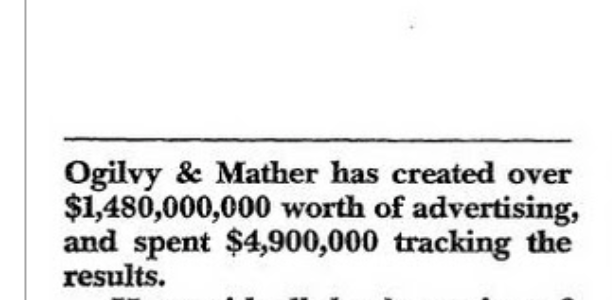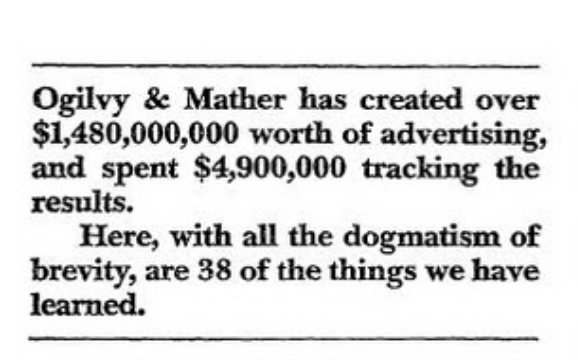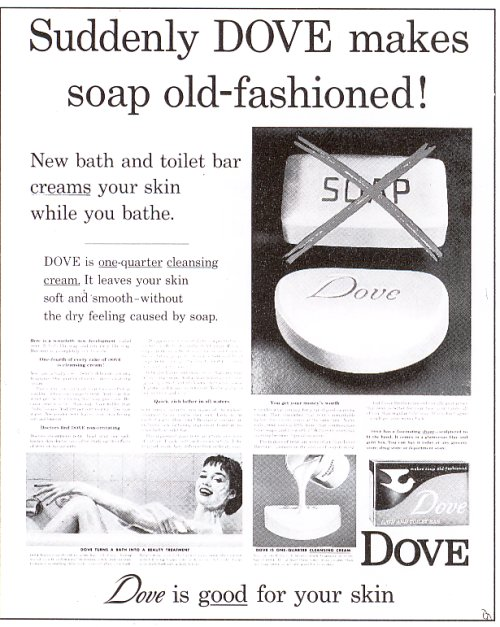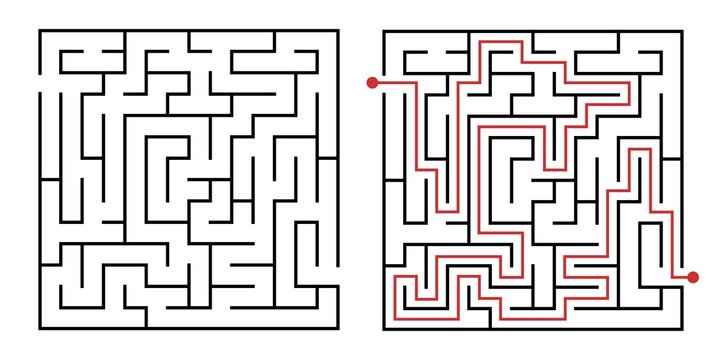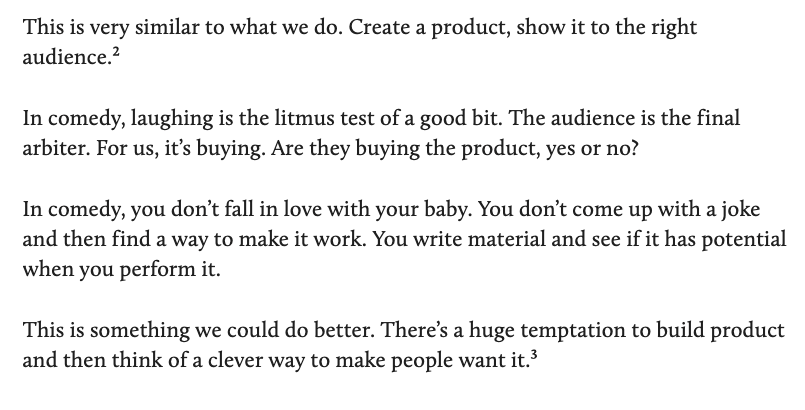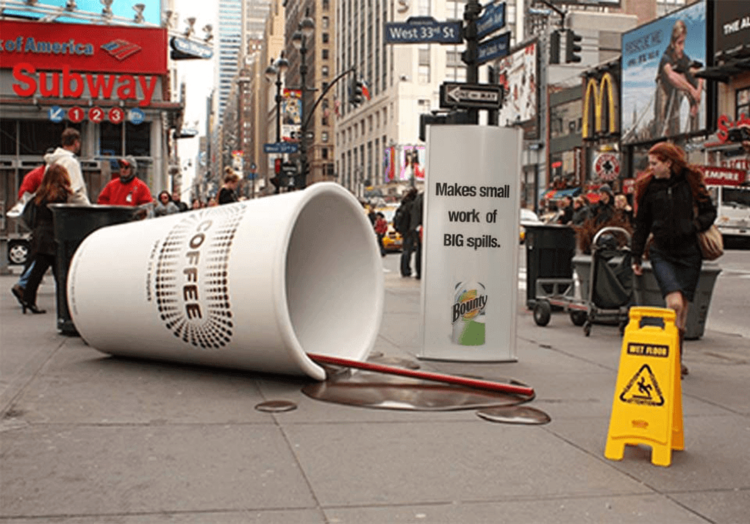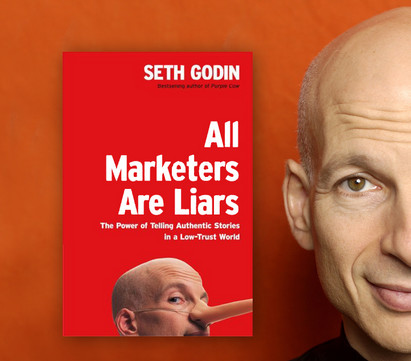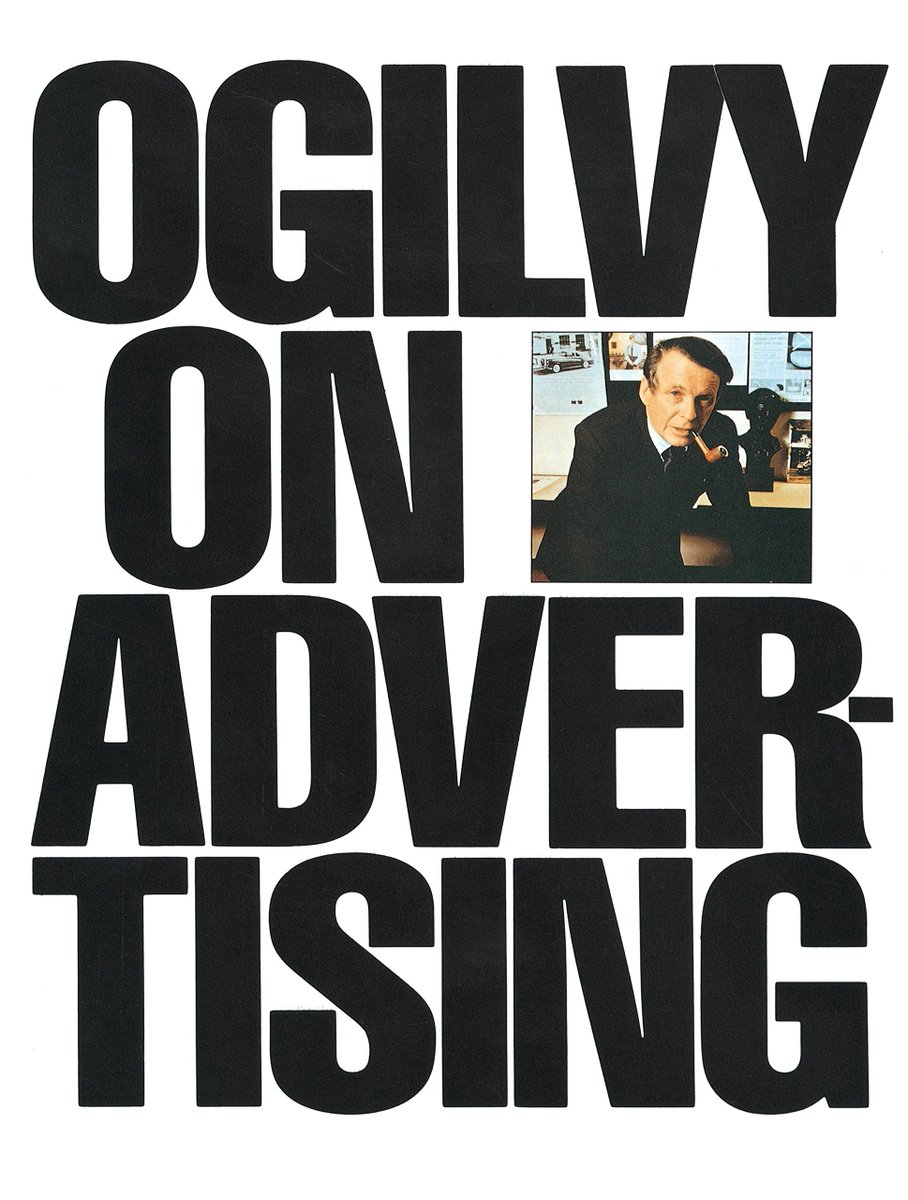[Advertising Monday] 6 Lessons from Ogilvy on Advertising That Sells
David Mackenzie Ogilvy is one of the immortals when it comes to advertising.
There are so many things he pioneered (e.g. deep consumer research), it& #39;s not even funny anymore.
This https://abs.twimg.com/emoji/v2/... draggable="false" alt="🧵" title="Thread" aria-label="Emoji: Thread"> will make your ads better
https://abs.twimg.com/emoji/v2/... draggable="false" alt="🧵" title="Thread" aria-label="Emoji: Thread"> will make your ads better
David Mackenzie Ogilvy is one of the immortals when it comes to advertising.
There are so many things he pioneered (e.g. deep consumer research), it& #39;s not even funny anymore.
This
1/ Ads That Win Are Ads That Make a Large Promise
This ad https://abs.twimg.com/emoji/v2/... draggable="false" alt="👇🏽" title="Rückhand Zeigefinger nach unten (mittlerer Hautton)" aria-label="Emoji: Rückhand Zeigefinger nach unten (mittlerer Hautton)"> is so obnoxiously good, it deserves its own breakdown. (Maybe next Monday?)
https://abs.twimg.com/emoji/v2/... draggable="false" alt="👇🏽" title="Rückhand Zeigefinger nach unten (mittlerer Hautton)" aria-label="Emoji: Rückhand Zeigefinger nach unten (mittlerer Hautton)"> is so obnoxiously good, it deserves its own breakdown. (Maybe next Monday?)
There are no pictures, it& #39;s not short, it& #39;s not clickbaity, and it& #39;s incredibly unsexy compared to modern advertising.
This ad
There are no pictures, it& #39;s not short, it& #39;s not clickbaity, and it& #39;s incredibly unsexy compared to modern advertising.
Look at the first line.
"Ogilvy & Mather has created over $1,480,000,000 worth of advertising, and spend $4,900,000 tracking the results."
It immediately establishes credibility; why should I listen to you?
"Ogilvy & Mather has created over $1,480,000,000 worth of advertising, and spend $4,900,000 tracking the results."
It immediately establishes credibility; why should I listen to you?
Now look at the second line.
"Here, with all the dogmatism of brevity, are 38 of the things we have learned."
If you weren& #39;t curious before, you& #39;re goddamn curious now.
Forget about reading.
This is the type of advertising you& #39;ll cut out of the magazine and put on your desk.
"Here, with all the dogmatism of brevity, are 38 of the things we have learned."
If you weren& #39;t curious before, you& #39;re goddamn curious now.
Forget about reading.
This is the type of advertising you& #39;ll cut out of the magazine and put on your desk.
2/ Respect Positioning
Ogilvy defined positioning as... u know what.. I& #39;ll let the Boss explain it himself.
“This curious verb is in great favor among marketing experts, but no two of them agree what it means. My own definition is ‘what the product does and who it is for.’”
Ogilvy defined positioning as... u know what.. I& #39;ll let the Boss explain it himself.
“This curious verb is in great favor among marketing experts, but no two of them agree what it means. My own definition is ‘what the product does and who it is for.’”
The best thing about good positioning is that it increases sales without changing the product... just the perception.
See also, https://twitter.com/YounglingAndCo/status/1391069108905680902?s=20">https://twitter.com/Youngling...
See also, https://twitter.com/YounglingAndCo/status/1391069108905680902?s=20">https://twitter.com/Youngling...
The tricky thing about positioning is tool bias.
(We equate how hard/easy something is by how hard/easy the tools are, not by how hard/easy it is.)
Once you see good positioning, you don& #39;t realize all the ways in which it could& #39;ve been messed up.
(We equate how hard/easy something is by how hard/easy the tools are, not by how hard/easy it is.)
Once you see good positioning, you don& #39;t realize all the ways in which it could& #39;ve been messed up.
I.e. if you& #39;re not aware of the maze, and you& #39;re guided through it, you& #39;ll overestimate how easy it is.
Just feels like a casual stroll. No getting lost. No onset of panic as the sun sets. No desperation as you run out of water.
More on tool bias here,
https://www.younglingresearch.com/essays/covid ">https://www.younglingresearch.com/essays/co...
Just feels like a casual stroll. No getting lost. No onset of panic as the sun sets. No desperation as you run out of water.
More on tool bias here,
https://www.younglingresearch.com/essays/covid ">https://www.younglingresearch.com/essays/co...
3/ If a Great Ad Doesn& #39;t Sell... It& #39;s Not a Great Ad ex vi termini (by implication).
"I don& #39;t want you to find my advertising creative, I want you to buy the product."
The job of the comic is to get a laugh. That& #39;s the litmus test. Our job is to sell.
https://www.younglingresearch.com/essays/onlyaudience">https://www.younglingresearch.com/essays/on...
"I don& #39;t want you to find my advertising creative, I want you to buy the product."
The job of the comic is to get a laugh. That& #39;s the litmus test. Our job is to sell.
https://www.younglingresearch.com/essays/onlyaudience">https://www.younglingresearch.com/essays/on...
4/ Think so Big it Scares You
"Be more ambitious. Don& #39;t bunt. When you get a job to do a story or an ad, try and hit the ball out of the park every time."
"Be more ambitious. Don& #39;t bunt. When you get a job to do a story or an ad, try and hit the ball out of the park every time."
@davetrott, another titan, put it like this:
"Think so big that you& #39;re embarrassed. When you& #39;re embarrassed, you stand out. When you stand out, you& #39;re not average. When you& #39;re not average, you might get noticed."
Your competition isn& #39;t other ads... it& #39;s being invisible.
"Think so big that you& #39;re embarrassed. When you& #39;re embarrassed, you stand out. When you stand out, you& #39;re not average. When you& #39;re not average, you might get noticed."
Your competition isn& #39;t other ads... it& #39;s being invisible.
5/ Your Product Has a Personality
The product& #39;s name, the price, the packaging, the advertising style, the context in which it& #39;s presented, and so on, are all a part of the brand image.
Seth Godin talks about this as "story" in All Marketers Are Liars.
The product& #39;s name, the price, the packaging, the advertising style, the context in which it& #39;s presented, and so on, are all a part of the brand image.
Seth Godin talks about this as "story" in All Marketers Are Liars.
So be consistent, over a long period of time.
Professor @markritson talked about "bothism," the importance of not just focusing on this quarter& #39;s results, but also on the things that have a longer time horizon.
Professor @markritson talked about "bothism," the importance of not just focusing on this quarter& #39;s results, but also on the things that have a longer time horizon.
In Ogilvy on Advertising, Ogilvy talks about how product perception actually creates reality:
"Take whiskey. Why do some people chose Jack Daniel& #39;s, while others choose Grand Dad or Taylor?
Have they tried all three and compared the taste? Don& #39;t make me laugh."
"Take whiskey. Why do some people chose Jack Daniel& #39;s, while others choose Grand Dad or Taylor?
Have they tried all three and compared the taste? Don& #39;t make me laugh."
"The reality is that these three brands have different images which appeal to different kinds of people.
It isn& #39;t the whiskey they choose, it& #39;s the image. The brand image is 90 percent of what the distiller has to sell."
It isn& #39;t the whiskey they choose, it& #39;s the image. The brand image is 90 percent of what the distiller has to sell."
"Researchers at the Department of Psychology at the University of California gave distilled water to students.
They told some of them that it was distilled water, and asked them to describe its taste. Most said it had no taste of any kind."
They told some of them that it was distilled water, and asked them to describe its taste. Most said it had no taste of any kind."
"They told the other students that the distilled water came out of the tap.
Most of them said it tasted horrible.
The mere mention of tap conjured up an image of chlorine."
Most of them said it tasted horrible.
The mere mention of tap conjured up an image of chlorine."
"Give people a taste of Old Crow, and tell them it& #39;s Old Crow.
Then give them another taste of Old Crow, but tell them it& #39;s Jack Daniel& #39;s.
Ask them which they prefer.
They& #39;ll think the two drinks are quite different. They are tasting images.”
Then give them another taste of Old Crow, but tell them it& #39;s Jack Daniel& #39;s.
Ask them which they prefer.
They& #39;ll think the two drinks are quite different. They are tasting images.”
Also, watch this ad. I& #39;ve timestamped it for you.
Listen to what he says when it& #39;s done.
There& #39;s not much difference between various brands of coffee. Consumers buy the one with the best brand image. ">https://youtu.be/cE8y3-Mqk...
Listen to what he says when it& #39;s done.
There& #39;s not much difference between various brands of coffee. Consumers buy the one with the best brand image. ">https://youtu.be/cE8y3-Mqk...
Oh, and lastly... this is kinda like set theory in mathematics.
You always have a set... if it& #39;s empty, you simply call it an empty set.
Z = {∅}
Your product has a personality. If you think it doesn& #39;t, it& #39;s simply a boring/forgettable one.
You always have a set... if it& #39;s empty, you simply call it an empty set.
Z = {∅}
Your product has a personality. If you think it doesn& #39;t, it& #39;s simply a boring/forgettable one.
6/ Trust Results, Not Creativity
Ogilvy said general advertising agencies are clueless.
Direct response agencies (any ad whose effectiveness can be measured) know exactly what works to the dollar.
Data > Ideology
Here& #39;s one of my fav videos on this, https://youtu.be/Br2KSsaTzUc ">https://youtu.be/Br2KSsaTz...
Ogilvy said general advertising agencies are clueless.
Direct response agencies (any ad whose effectiveness can be measured) know exactly what works to the dollar.
Data > Ideology
Here& #39;s one of my fav videos on this, https://youtu.be/Br2KSsaTzUc ">https://youtu.be/Br2KSsaTz...
"They [general advertising] worship at the altar of creativity.
Which really means originality, the most dangerous word in the lexicon of advertising.
The chasm [between direct response and gen. ad.] is wide.
On your side, I see knowledge. On theirs, ignorance."
Which really means originality, the most dangerous word in the lexicon of advertising.
The chasm [between direct response and gen. ad.] is wide.
On your side, I see knowledge. On theirs, ignorance."
I could keep this thread going forever but instead, let& #39;s pick this up next time.
This thread took me about 4 hours to make, so if you enjoyed it, follow me @YounglingAndCo.
I& #39;m shipping a thread daily in May.
Let& #39;s wrap up:
This thread took me about 4 hours to make, so if you enjoyed it, follow me @YounglingAndCo.
I& #39;m shipping a thread daily in May.
Let& #39;s wrap up:

 Read on Twitter
Read on Twitter![Thread [Advertising Monday] 6 Lessons from Ogilvy on Advertising That SellsDavid Mackenzie Ogilvy is one of the immortals when it comes to advertising.There are so many things he pioneered (e.g. deep consumer research), it& #39;s not even funny anymore.This https://abs.twimg.com/emoji/v2/... draggable=](https://pbs.twimg.com/media/E1CFIq9X0AIXMBD.jpg) will make your ads better" title="[Advertising Monday] 6 Lessons from Ogilvy on Advertising That SellsDavid Mackenzie Ogilvy is one of the immortals when it comes to advertising.There are so many things he pioneered (e.g. deep consumer research), it& #39;s not even funny anymore.This https://abs.twimg.com/emoji/v2/... draggable="false" alt="🧵" title="Thread" aria-label="Emoji: Thread"> will make your ads better" class="img-responsive" style="max-width:100%;"/>
will make your ads better" title="[Advertising Monday] 6 Lessons from Ogilvy on Advertising That SellsDavid Mackenzie Ogilvy is one of the immortals when it comes to advertising.There are so many things he pioneered (e.g. deep consumer research), it& #39;s not even funny anymore.This https://abs.twimg.com/emoji/v2/... draggable="false" alt="🧵" title="Thread" aria-label="Emoji: Thread"> will make your ads better" class="img-responsive" style="max-width:100%;"/>
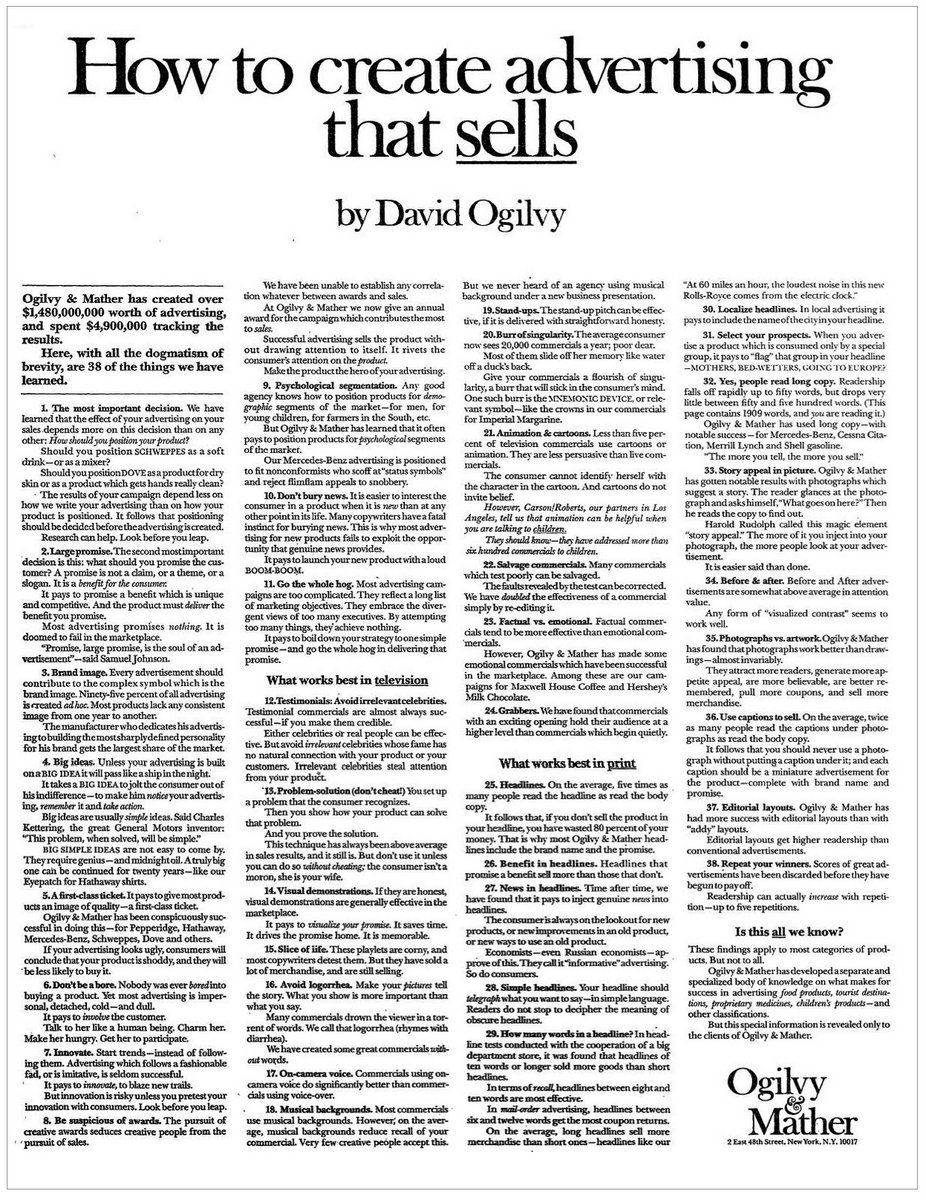 is so obnoxiously good, it deserves its own breakdown. (Maybe next Monday?)There are no pictures, it& #39;s not short, it& #39;s not clickbaity, and it& #39;s incredibly unsexy compared to modern advertising." title="1/ Ads That Win Are Ads That Make a Large PromiseThis adhttps://abs.twimg.com/emoji/v2/... draggable="false" alt="👇🏽" title="Rückhand Zeigefinger nach unten (mittlerer Hautton)" aria-label="Emoji: Rückhand Zeigefinger nach unten (mittlerer Hautton)"> is so obnoxiously good, it deserves its own breakdown. (Maybe next Monday?)There are no pictures, it& #39;s not short, it& #39;s not clickbaity, and it& #39;s incredibly unsexy compared to modern advertising." class="img-responsive" style="max-width:100%;"/>
is so obnoxiously good, it deserves its own breakdown. (Maybe next Monday?)There are no pictures, it& #39;s not short, it& #39;s not clickbaity, and it& #39;s incredibly unsexy compared to modern advertising." title="1/ Ads That Win Are Ads That Make a Large PromiseThis adhttps://abs.twimg.com/emoji/v2/... draggable="false" alt="👇🏽" title="Rückhand Zeigefinger nach unten (mittlerer Hautton)" aria-label="Emoji: Rückhand Zeigefinger nach unten (mittlerer Hautton)"> is so obnoxiously good, it deserves its own breakdown. (Maybe next Monday?)There are no pictures, it& #39;s not short, it& #39;s not clickbaity, and it& #39;s incredibly unsexy compared to modern advertising." class="img-responsive" style="max-width:100%;"/>
